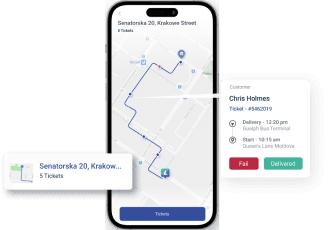TABLE OF CONTENTS

Sign-Up
Enter your email address
Why Does the Healthcare Industry Need GPS?
Hospital Asset Tracking Software functions as a map capable of pinpointing our exact location on Earth. But what purpose could GPS serve within the healthcare industry, the very field dedicated to preserving our well-being?
Finding Patients Quickly:
In emergencies, doctors and paramedics often face the urgent need to reach patients swiftly. To aid them in this crucial task, GPS Tracking Solution For Healthcare proves invaluable by accurately pinpointing the patient’s precise location, be it at home, on the road, or in a remote area.
Navigating Ambulances:
Ambulances leverage GPS technology to identify and navigate the most efficient paths towards hospitals. It is similar to having an exceptionally intelligent guide within the ambulance, ensuring that individuals in need receive prompt medical attention at the swiftest possible pace.
Tracking Medical Supplies:
Hospitals possess a wide array of medical supplies, with some holding immense significance, such as life-saving medications and organs designated for transplantation. To ensure these vital resources reach their intended destinations promptly, hospitals rely on GPS technology for efficient tracking and delivery.
Visiting Patients at Home:
Doctors and nurses sometimes need to visit patients at their homes. In big cities with many streets, GPS technology guides them to the correct house.
Medical Research:
Scientists utilize GPS technology to gather data from various locations, enabling them to study the spread of diseases in different areas. By precisely tracking the sampling locations using GPS, researchers can analyze how diseases propagate and understand their patterns across diverse regions.
Benefits of GPS Tracking in Healthcare
GPS tracking serves as a guardian angel for the healthcare industry, providing numerous advantages that enhance the efficiency, speed, and reliability of healthcare services. In simple terms, let us delve into these remarkable benefits!
1. Keeps Track of Medical Equipment:
One major advantage of GPS tracking is the ability to monitor medical equipment in hospitals and clinics. These facilities house numerous crucial devices that can be quite expensive. By utilizing GPS technology, healthcare professionals can ensure that this equipment remains accounted for and does not go missing.
2. Speeds Up Emergency Responses:
During emergencies, the availability of prompt assistance becomes crucial. The implementation of GPS tracking technology enables ambulances to efficiently navigate and reach patients by using the most optimal routes. Consequently, individuals in need receive timely aid, significantly enhancing the likelihood of saving lives.
3. Ensures Safety of Vehicles:
Ambulances and other healthcare vehicles play a crucial role in saving lives. To ensure their safety, GPS tracking is employed to constantly monitor their location. This allows for swift recovery in case any vehicle goes missing.
4. Enhances Delivery Efficiency:
The timely delivery of medicines and medical supplies plays a critical role in ensuring people receive the care they need. To achieve efficiency and promptness, GPS tracking technology proves invaluable. By assisting drivers in selecting optimal routes, avoiding traffic congestion, and ensuring the timely arrival of medical supplies to where they are most needed, GPS tracking contributes significantly to improving healthcare logistics.
5. Aids in Following Regulations:
In healthcare, numerous regulations exist regarding driving times, rest breaks, and more. The implementation of GPS tracking plays a pivotal role in ensuring compliance with these rules. Consequently, it safeguards healthcare providers from any potential troubles and guarantees that they consistently provide the utmost care for their patients.
6. Boosts Communication:
In healthcare, effective communication plays a vital role. Employing GPS tracking enhances communication among staff members, ensuring everyone stays informed about the whereabouts of vehicles and equipment. This leads to smoother operations and improved efficiency.
7. Helps in Planning:
GPS tracking aids healthcare providers in improving their planning capabilities. By utilizing this technology, they can efficiently schedule deliveries, patient pickups, and other necessary services. This allows them to enhance the quality of care and service provided to their patients, ensuring optimal outcomes.
8. Provides Valuable Data:
Lastly, healthcare providers can utilize GPS tracking to gather valuable information, enabling them to improve their services. By pinpointing areas that require enhancements, providers can make necessary adjustments for service optimization.
How to Choose a GPS Tracking Solution?
When considering a GPS tracking solution for your healthcare facility, it is important to carefully assess its specific needs.
Understand Your Needs
To begin with, one must grasp the purpose behind GPS tracking. Are you affiliated with a business seeking to monitor its fleet or a concerned parent focused on safeguarding your children? Understanding your specific requirements will aid in selecting the most suitable type of GPS tracking system.
Set a Budget
Afterwards, individuals should determine their allocated funds for a GPS tracking solution. Numerous options are available at varying price points, ranging from more affordable to higher-end alternatives. Establishing a budget will assist in narrowing down the selection of choices.
Consider Ease of Use
Consider the individuals who will utilize the GPS tracking system. It should offer simplicity and ease of use to them. Seek out a system that features a straightforward and user-friendly interface. Furthermore, having reliable customer support for assistance in case any concerns arise would be an added advantage.
Look for Reviews
It is recommended to allocate some time to read reviews of the GPS tracking systems under your consideration. Evaluations shared by other users offer valuable insights into the strengths and weaknesses of each system, enabling you to make a more informed decision.
Think About the Future
Finally, consider your future requirements. Will there be a need to expand the tracking system by incorporating additional devices? It is essential to select a GPS tracking solution that can accommodate your evolving needs.
Conclusion:
GPS tracking is an invaluable superhero for the healthcare industry, ensuring the efficient management of equipment, vehicles, and timely deliveries. In times of emergencies, it acts as a reliable ally by providing crucial assistance. By selecting the appropriate GPS tracking solution, healthcare providers can enhance their performance and prioritize the well-being and satisfaction of patients and staff alike.
There it is, all the essential information about GPS tracking in the healthcare industry. It is important to note that investing in this technology can greatly enhance safety and efficiency for healthcare providers.

Aiden mitchell
As a GPS Tech geek, I find Lumyri's transformative impact on GPS technology on businesses and their customers. Real-time tracking information empowers businesses to provide accurate delivery estimates, allowing customers to plan their schedules with precision.



